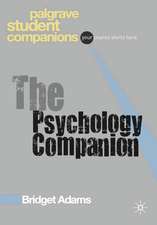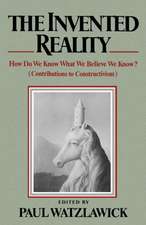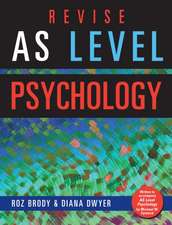Spirit, Science, and Health: How the Spiritual Mind Fuels Physical Wellness
Editat de Thomas G. Plante Ph.D., Carl E. Thoresenen Limba Engleză Hardback – 29 iun 2007 – vârsta până la 17 ani
Preț: 338.38 lei
Preț vechi: 434.75 lei
-22% Nou
Puncte Express: 508
Preț estimativ în valută:
64.75€ • 67.60$ • 53.59£
64.75€ • 67.60$ • 53.59£
Carte tipărită la comandă
Livrare economică 05-19 aprilie
Preluare comenzi: 021 569.72.76
Specificații
ISBN-13: 9780275995065
ISBN-10: 0275995062
Pagini: 248
Dimensiuni: 156 x 235 x 24 mm
Greutate: 0.53 kg
Editura: Bloomsbury Publishing
Colecția Praeger
Locul publicării:New York, United States
ISBN-10: 0275995062
Pagini: 248
Dimensiuni: 156 x 235 x 24 mm
Greutate: 0.53 kg
Editura: Bloomsbury Publishing
Colecția Praeger
Locul publicării:New York, United States
Notă biografică
Thomas G. Plante is Professor and Chair of Psychology at Santa Clara University and Adjunct Clinical Associate Professor of Psychiatry and Behavioral Sciences at Stanford University School of Medicine. He has authored, edited, or co-edited 10 books, and more than 100 chapters and journal articles. Widely known in the popular media, Plante has been featured in TIME, People, USA Today, Newsweek, and U.S. News and World Report. He is series editor for the Preager series, Abnormal Psychology.Carl E. Thoresen is Professor Emeritus of Education and Psychology, and, by courtesy, Psychiatry/Behavioral Science at Stanford University. He is also a Senior Fellow at the Spirituality & Health Institute at Santa Clara University. Thoresen has worked in the field of Counseling and Health Psychology for more than 30 years. A Founding Fellow for the Society of Behavioral Medicine, he served on an Expert Panel for the National Institutes of Health Office of Behavioral and Social Sciences, focused on spirituality and health. His many awards include the John Guggenheim Foundation Fellowship, election to Fellow status in the American Association for the Advancement of Science, American Psychological Association, and the Academy of Behavioral Medicine Research.
Recenzii
This book could serve very effectively as a brief reference handbook or as an introductory textbook for the emerging field of spirituality and health--now a component in the curriculum of many schools of nursing, medicine, and other health-related professions, as well as in some colleges of liberal arts or education. The book is a particularly well-integrated collection of short reports on the current state of the field. It covers concepts and assessment instruments typically used in spirituality-and-health research. It also covers basic techniques for self-management and personal development (such as prayer and meditation) that long have been part of spiritual traditions, and increasingly are recognized as having relevance for health maintenance too. The book concludes with consideration of general ethical issues and with problems characteristic of specific population groups, e.g., adolescents, the elderly, HIV/AIDS sufferers, and cancer patients. Contributors treat these issues with discernment, respect, and appropriate expertise..Recommended. All levels.
Medicine is increasingly embracing a health promotion rather than disease model. As associates with the Spirituality and Health Institute at Santa Clara U., Plante and Thoreson, introduce 14 chapters examining how the formerly little-researched psychosocial factor of spirituality/religion relates to health in general and to specific patient populations. Social cognitive theory, to which the contributions of preface writer Albert Bandura Stanford U.) are well-known, is used to explain the demonstrated health effects of such practices as meditation and holy name repetition. Case examples treat ethical pitfalls.
Medicine is increasingly embracing a health promotion rather than disease model. As associates with the Spirituality and Health Institute at Santa Clara U., Plante and Thoreson, introduce 14 chapters examining how the formerly little-researched psychosocial factor of spirituality/religion relates to health in general and to specific patient populations. Social cognitive theory, to which the contributions of preface writer Albert Bandura Stanford U.) are well-known, is used to explain the demonstrated health effects of such practices as meditation and holy name repetition. Case examples treat ethical pitfalls.












